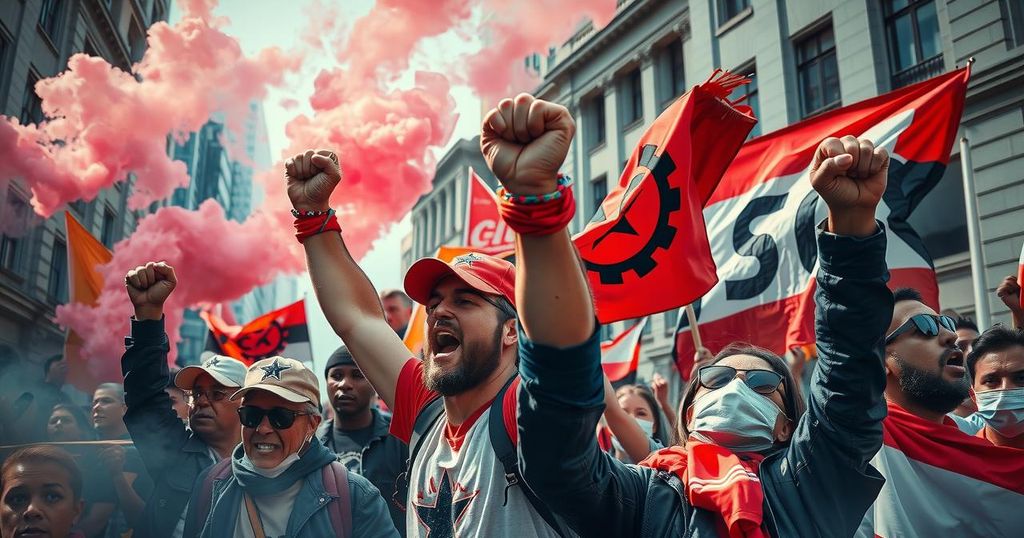Protests Erupt in Kenya Following Death of Activist Albert Ojwang in Custody

Protests have erupted in Kenya after activist Albert Ojwang dies in police custody. Following his arrest for allegedly damaging the police’s reputation online, Ojwang’s death has sparked outrage as details surrounding the incident raise many questions. His family and supporters dispute the police’s claims regarding the cause of death, leading to public demonstrations and demands for accountability from the government.
In Kenya, unrest is escalating following the shocking death of activist Albert Ojwang while in police custody. Ojwang was arrested on Saturday for allegedly tarnishing the police’s reputation online. This incident is intensifying tensions as it coincides with the upcoming one-year anniversary of widespread protests against governmental corruption and unpopular tax reforms that swept the nation last year.
Ojwang died just hours after his detainment. Authorities state he injured himself by repeatedly banging his head against the wall of his cell—a claim both his family and supporters staunchly reject. An autopsy initially set for Monday was delayed and is now scheduled for Tuesday, with results highly anticipated. Ojwang’s father has been reportedly waiting at the morgue for hours, expressing skepticism about the official statements.
Julius Juma, the family’s lawyer, voiced his concerns to the media: “We do not yet know the exact cause of Albert’s death or who is responsible. If he was arrested for the reasons given, why was he placed in solitary confinement? Why are we being told he hit his head against the wall? His body showed numerous injuries—to his head, hands, and shoulders. His head was completely swollen.”
In response, several human rights activists congregated at the morgue demanding justice for Ojwang. Hussein Khalid, the head of Vocal Africa, strongly asserted: “We say: ‘enough is enough’. We have lost too many lives at the hands of the police. Whatever the circumstances, no one should die in police custody.”
Protests erupted in Nairobi on Monday, particularly near the Central Police Station where Ojwang breathed his last. Tensions escalated as some demonstrators clashed with police who deployed tear gas against the crowd. The police maintained that Ojwang was found unconscious and later pronounced dead at the hospital.
In an effort to address the incident, all officers involved that night have been suspended pending an investigation by the Independent Policing Oversight Authority. Police Inspector-General Douglas Kanja confirmed they will not return to work until the inquiry concludes. Many remain doubtful about the integrity of the investigation processes, with some suggesting it may merely scapegoat junior officers.
Khalid stated, “Until now they have not told us the truth. We know there were more injuries. They have decided to sacrifice junior officers. We want justice for Ojwang and many others who have lost their lives.”
The rights organization Amnesty Kenya also weighed in, asserting that Ojwang’s arrest raises significant concerns. They demanded that the IPOA’s findings be public, and that any officers found culpable face accountability. This tragic death comes nearly a year after numerous activists were killed or abducted by police during protests against finance bills.
While the government attempted to quell economic frustration by withdrawing the contentious finance bill, dissatisfaction remains rampant. Ndungi Githuku, an activist from the People’s Liberation Party, highlighted the continuing struggles: “Our demands are still not met. The joblessness they had last year is tenfold. The killings are still happening.”
Ojwang’s untimely death has sparked rampant outrage online, rekindling calls for demonstrations aimed at demanding accountability from the government. Githuku pointedly noted, “This government is actually urging us to come out in the street again. They are saying they have not repented; they are saying that they will continue abducting and assassinating us. So, we are saying that it’s better to shout and die than to keep quiet and be gotten from our homes while we are quiet.”
In conclusion, the recent death of activist Albert Ojwang in police custody has ignited widespread protests and raised serious questions about police accountability in Kenya. As activists gather to demand justice, the historical context of prior protests against police violence and corruption remains fresh in the minds of many Kenyans. With investigations ongoing and public sentiment boiling over, the potential for further unrest looms significantly as citizens assert their demand for accountability from the government.
Original Source: www.rfi.fr








